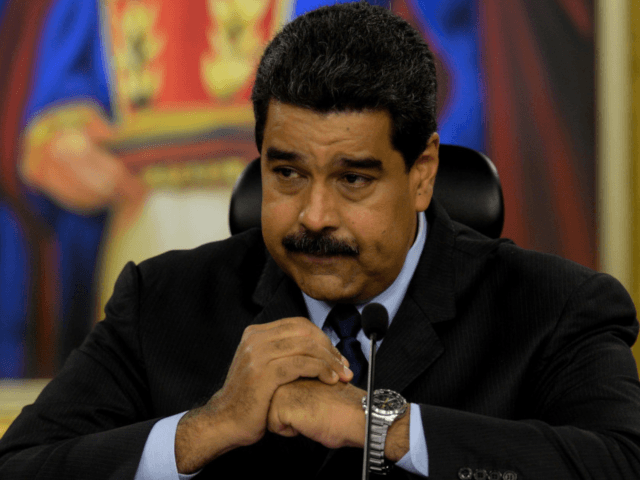The Venezuelan Penal Forum, a non-governmental organization (NGO) that tracks political prisoners in the country, warned on Wednesday that dictator Nicolás Maduro may sneak common criminals into any agreement to free his political enemies.
Maduro announced new “talks” this week with individuals he claimed represent the Venezuelan opposition. The parties invited to the talks are almost entirely Marxist — some to the left of Maduro’s United Socialist Party of Venezuela (PSUV) — and do not represent any significant percentage of the Venezuelan population. President Juan Guaidó, legally the head of state of the country despite Maduro refusing to hand over military power, is not participating in the talks.
The “opposition” engaged in the talks has spread rumors that the regime may begin freeing some of the hundreds of political prisoners it is keeping as part of a deal with them. Maduro denies holding any prisoners of conscience and has arrested journalists, including Univision’s Jorge Ramos, for discussing the torture and imprisonment of political dissidents.
Maduro’s regime abruptly freed Guaidó’s second-in-command, First Vice President of the National Assembly Edgar Zambrano, on Tuesday, after four months of incarceration without being presented with any evidence he had committed a crime. Secret police agents towed Zambrano to prison in May after he refused to get out of his car but never presented him with any particular charges.
Zambrano used his freedom to immediately call for the liberation of all political prisoners, and reports began to circulate that Maduro may trade prisoners for some international goodwill.
The Venezuelan newspaper El Nacional reported on Thursday that parties to the talks with Maduro — which include groups such as “Movement Towards Socialism” and the “Progressive Alliance” — were screening prisoners on Wednesday at the Helicoide, a former shopping-mall-to-be turned into a prison for political dissidents and the headquarters of the Bolivarian Intelligence Agency (SEBIN). The newspaper claimed the politicians were interviewing prisoners and met with 20 individuals who were “candidates” for release as part of a deal between the leftist parties and Maduro. As many as 60 individuals could be conditionally released under house arrest or probation, the report added.
Alfredo Romero, the director of the Venezuelan Penal Forum, warned that the information currently available does not guarantee that the individuals released, if any, will be prisoners of conscience.
Speaking on Wednesday to Venezuelan outlet Unión Radio, Romero said that Maduro’s regime “regularly includes in its group of freed suspected political prisoners some who are not [political prisoners], but common criminals.”
“These liberations are a form of extortion and intimidation,” Romero warned, suggesting that the Maduro regime would rapidly fill the empty cells, some that once held criminals, with political dissidents. “All this is just a show to benefit some factions who want to win some sort of medal.”
Maduro’s regime is heavily engaged in cocaine trafficking and allied with terrorist organizations like the Revolutionary Armed Forces of Colombia (FARC) and Hezbollah. It also often employs violent criminals to intimidate political dissidents and attack them, forming violent gangs called colectivos.
Romero noted on a separate program on Venezuela’s NTN24 that, even in the event that the number of political prisoners discussed would be freed, they would be a minuscule number of the people being tortured in political prisons nationwide. The Venezuelan Penal Forum has certified the existence of 477 political prisoners in the country as of this week.
“If they free, let’s say, 40 people, that would represent ten percent, less than ten percent, of the 477 political prisoners still behind bars. So the first problem is that a group of political prisoners under the same unjust and political circumstances of arrest will be left forgotten, trapped,” said Romero. “And the second point is that the revolving door gets greased up — while they free people, they imprison even more of them.”
Alfredo Romero: liberar 40 presos políticos en Venezuela no representaría ni el 10% de los que están tras las rejas https://t.co/G90bql3CWL pic.twitter.com/qVxet3j1uo
— NTN24 (@NTN24) September 18, 2019
Maduro has repeatedly denied the existence of political prisoners in the country. In a dramatic moment for Maduro, he arrested Ramos and his team while in Caracas in February after Ramos asked him about the prisoners. Maduro denied their existence, so Ramos handed him a list with the hundreds of names of individuals detained for opposing socialism. Ramos also showed Maduro a video of Venezuelans eating out of a garbage truck, asking him why he had implemented policies that were starving his people.
Maduro reportedly “didn’t like” the interview, confiscated it, and arrested the team. Univision acquired the lost video footage in May through contacts in the Venezuelan government that confirmed Ramos’s version of events and showed Maduro flatly denying the existence of prisoners of conscience.
“Take your little garbage and take it away, comrade,” Maduro said, swatting away the list of prisoners.
Follow Frances Martel on Facebook and Twitter.

COMMENTS
Please let us know if you're having issues with commenting.